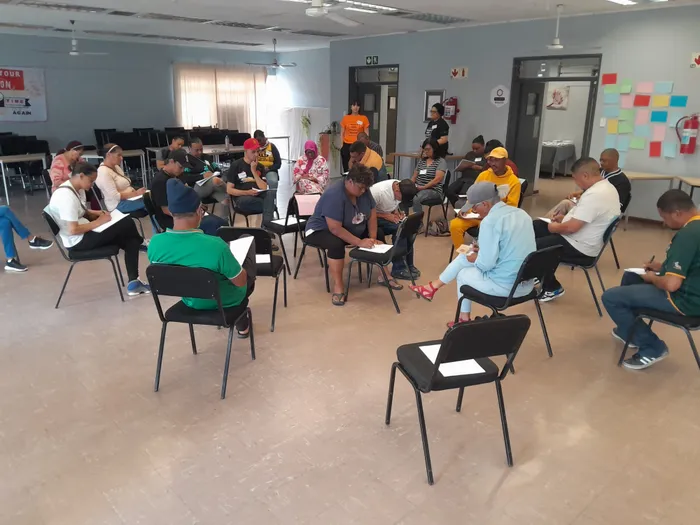'We will only grow if we heal’

Participants in a two-day course on how first responders can help abuse victims took part in a mental-resilience exercise, describing traumatic events in their own lives.
A woman wanting to give others the help she never had when she was raped. A man confronting the horrors of his childhood. These were some of the 30-odd people who met in Athlone at the weekend for a two-day course on how to help abuse victims.
The training, provided by the Callas Foundation at the Saartjie Baartman Centre, was aimed at neighbourhood watch members, community leaders and other potential first responders at crime scenes, according to the foundation’s founder, Caroline Peters.
The foundation plans to hold eight two-day sessions for various neighbourhood watches and community police forums.
First responders should know the law, what to do and what not do to when responding to an abuse case, and they need to know how to treat victims and where to refer them for help, Ms Peters said.
“We need to know what gender-based violence is and why has it become a norm in the community. We want them to be able to respond to GBV cases and know how to support women through the court justice system.”
During the course, participants took part in a mental-resilience exercise, describing traumatic events in their own lives.
It was important to heal from past trauma because the body remembered it, and past trauma could shape our responses to current situations, said Ms Peters.
“Become confident with who you are. Put up healthy boundaries even if it makes the other person feel uncomfortable,” she said.
“Toxic masculinity” should be tackled because “our men don't know how to be men”, she said. “Our children need positive male role models. They look up to gangsters. Men just go on and move past trauma, and it takes long for men to open up and make themselves vulnerable. We will only grow if we heal.”
A neighbourhood watch member said she wanted to be strong for victims of abuse so that as a first responder she could give them the support she never had when she was gang raped on her way to a Lansdowne party in 1999.
“Thinking about it now, I knew I had to find the strength to become a survivor. I had to fight to get my life back. In South Africa at that time, you didn't talk about being raped, so I always thought what about other women and young girls? The healing journey is still ongoing. I become a different person in August every year. I still have flashbacks, but I also have so much to live for,” she said.
An Athlone man said he had become a neighbourhood watch member to help others because he had never had anyone to help him while he was growing up in an abusive home. He described how his father would beat his mother over money for alcohol and drugs, and how he, at the age of 10, had started selling drugs to give his father money so the beatings would stop.
But the beatings had not stopped.
Sometimes he would lock himself in the toilet while his father beat his mother. Sometimes he would take the beatings for his mother. Sometimes his father would drag his mother out into the street by her hair and beat her there.
“He abused me, hit me with dog chains,” he said. “I was so indoctrinated by him. I just wanted to save her so I started following his line and made him believe that he was right so that he wouldn't hit her. That forced me into drinking and drugs.
“He said I was a weakling for siding with my mom and often said I wasn’t his son, I was a moffie. I could never get his approval as a child.
“At 14, I stabbed my father in the road. People said I was wrong. I told myself I had to be a man, so I stabbed him.”

